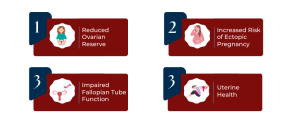How Smoking Affects Male and Female Fertility

Smoking is a widespread habit that can have severe consequences on various aspects of health, including fertility. For couples in Jaipur and around the world trying to conceive, understanding the impact of smoking on both male and female fertility is crucial. This blog post explores the effects of smoking on reproductive health and its implications for those seeking treatment.
The Impact of Smoking on Male Fertility
Smoking can significantly affect male fertility in several ways:
1. Reduced Sperm Count: Men who smoke typically have a lower sperm count compared to non-smokers. This reduction in sperm production can make conception more challenging.
2. Decreased Sperm Motility: Smoking affects the ability of sperm to swim effectively, reducing their chances of reaching and fertilizing an egg.
3. DNA Damage: The toxins in cigarette smoke can cause damage to the DNA in sperm, potentially leading to birth defects or increasing the risk of miscarriage.
4. Hormonal Imbalance: Smoking can disrupt the balance of hormones necessary for healthy sperm production.
For men experiencing male infertility in Jaipur, quitting smoking could be a crucial step towards improving their reproductive health and increasing their chances of fatherhood.

How Smoking Affects Female Fertility
Women who smoke also face significant fertility challenges:
1. Reduced Ovarian Reserve: Smoking accelerates the loss of eggs, potentially leading to earlier menopause and reduced fertility.
2. Increased Risk of Ectopic Pregnancy: Smokers have a higher risk of ectopic pregnancies, which can be life-threatening and impact future fertility.
3. Impaired Fallopian Tube Function: The ciliary function in the fallopian tubes can be compromised by smoking, affecting the transport of eggs and embryos.
4. Uterine Health: Smoking can affect the lining of the uterus, making it less receptive to embryo implantation.
Women seeking treatment for female infertility in Jaipur should be aware that quitting smoking can significantly improve their chances of successful conception and a healthy pregnancy.

The Combined Effect on Couples
When both partners smoke, the negative effects on fertility are compounded. Couples may face:
1. Longer time to conception
2. Higher risk of miscarriage
3. Increased likelihood of requiring fertility treatments
Quitting Smoking for Fertility
For couples struggling with infertility, quitting smoking is one of the most impactful steps they can take to improve their chances of conception. Benefits of quitting include:
1. Improved sperm quality and count for men
2. Better ovarian function and egg quality for women
3. Reduced risk of pregnancy complications
4. Overall better health, which supports fertility
Seeking Help
If you’re dealing with infertility and are a smoker, consider:
1. Consulting with a fertility specialist who can provide personalized advice
2. Joining smoking cessation programs
3. Exploring alternative stress-relief methods to replace smoking
Remember, quitting smoking not only improves your fertility but also enhances your overall health and the health of your future child.
Conclusion:
Understanding the impact of smoking on fertility is crucial for couples trying to conceive. Whether you’re dealing with infertility quitting smoking can significantly improve your reproductive health and increase your chances of starting a family. Take the first step towards a smoke-free life and a healthier reproductive future today.
